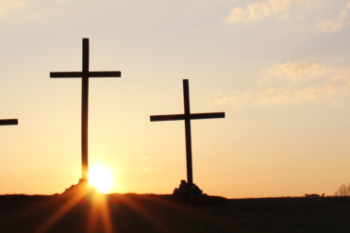Bleeding in the Sermon: How to Preach in Grief
“It’s Frederick Buechner’s fault,” I tell myself on Sunday morning. I’m getting ready to return to my home church to speak. I’m trying to figure out who is to blame for this strange emotional position I find myself in: I’m going to be in the same room where I’ve delivered my family’s eulogies, and now I have to try to find words for how and why we should be faithful in and through grief. The truth is that I am still figuring it all out and finding the words for myself.
This particular Sunday falls just a year after the days that have burned themselves onto my calendar and my nervous system. My parents, both diagnosed with awful things in 2018, died just a month apart in the summer of 2020. While the rest of the world was dealing with the pandemic, my dad was dying from pulmonary fibrosis, and my mom was suffering from Alzheimer’s.
Grief was not a new experience for me: I grew up with a sister who died from metastatic breast cancer when she was only 35. But the grief of losing her is fresh to me in this season. If I have anything to say, to teach, about grief, it’s that it can renew itself the same way mercy can. It can recede, and reappear. It can add and subtract and divide and multiply. Grief has been destroying me and healing me. And I’m supposed to find words for this.
All I can think of is the opening image in Frederick Buechner’s Telling the Truth: The Gospel as Tragedy, Comedy, and Fairy Tale where he recounts Henry Ward Beecher’s story of cutting himself shaving right before he preached. Buechner makes the case in the book that this is a defining picture of what it is to stand in front of people and say words about God: It’s about bleeding.
It’s only through the bleeding, through the true telling of our lives, that we can arrive at honest grace.
Buechner’s words about words were the first ones I ever read about preaching. And they have compelled and guided me ever since my days at Emmanuel. Every time I get the chance to speak in front of a church, I try to find the truest truth. I try to make it personal. What has God been doing in and around me? What am I learning or relearning or unlearning that could be useful in this community of faith?
One of my favorite passages in scripture is Psalm 107, this beautiful patterned song that collects several stories and puts them into a shared shape. The Psalm traces the stories of people who have been wandering in the desert, chained in prison, sick and hungry, and lost at sea. It gives order to all the disordered ways people may have journeyed towards the presence of God. Every section of the Psalm contains a struggle, a moment of a surrender, and a cause for praise.
I’ve always loved the implications of this Psalm: When we gather, no matter how we’ve made our way there, no matter how different our stories might be, we hear a reflection of our pain and our hope through worship. It’s why I believe both the stories of the preacher and the people matter. It’s why I hold on so tightly to Buechner’s words. It’s only through the bleeding, through the true telling of our lives, that we can arrive at honest grace.
But on this particular Sunday, and in this particular moment in the world, when grief is dominating my own life and is permeating so much of the public sphere, maybe that doesn’t need to be said out loud. Is it healthy to reveal to a crowd of people how trauma is changing the way I walk through the world right now? People are already bombarded enough with the bad news of the world. Do I have to talk louder about hope than I do about pain? Maybe I could throw in some jokes to let us all off the emotional hook.
These are the questions of this day but they are also the questions of this season. Even when I’m not speaking directly on the subject of grief, I’ve had to sort through how much of my real-time grieving should be a part of the public words I say about life with God. For all the questions I’ve had to ask, I’ve come up with at least a few working answers:
Grief can be a beautiful filter for seeing new layers to the stories of Scripture.
Even after a lifetime of reading and studying Scripture, grief has given me some brand new lenses. I can see new reasons for why Ruth makes such bold promises to Naomi, why she is desperate to hang onto whatever shreds of her life are still familiar to her. I appreciate even more how often Jesus is moved with compassion because the people he meets are losing the people they love.
Trauma experts have a lot to teach the church about how we operate and communicate.
The experience of learning about my own trauma and grief has given me the chance to consider how our environments can make room for people in trauma. The entire process of arriving at church and making my way through crowds and conversations has been altered by trauma and grief for me. I can imagine that this complexity is present for many people in our congregation who may occasionally need softer, slower settings.
Preaching is not always about teaching something new but giving language to what we all already know.
More than ever, as I’m looking out at the churches where I speak, I notice the faces who know their own pain and sorrow. I know that they have stared into their own abyss and come out with stories about the faithfulness of God. I know that they can add their own lines to the songs about how we make it through. We may be the one with the microphone but everyone in the room holds the story.
About The Author
Laura Buffington is a storyteller, preacher, and content creator. She is the online community pastor and part of the Teaching and Creative Team for SouthBrook Christian Church in Dayton, Ohio.
Laura hosts The Breakfast Translation podcast, an imaginative way to read the Bible. She holds a doctor of ministry degree from Emmanuel Christian Seminary at Milligan University in Tennessee.
Listen to the full message on grief that she gave at her home church.






